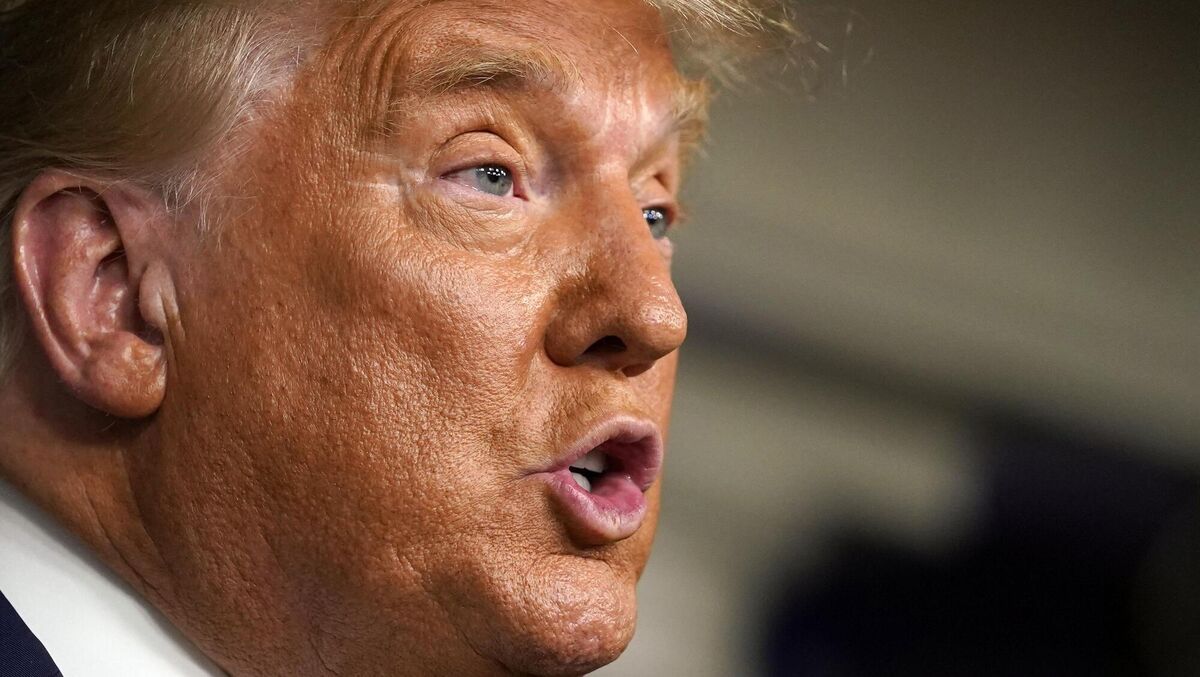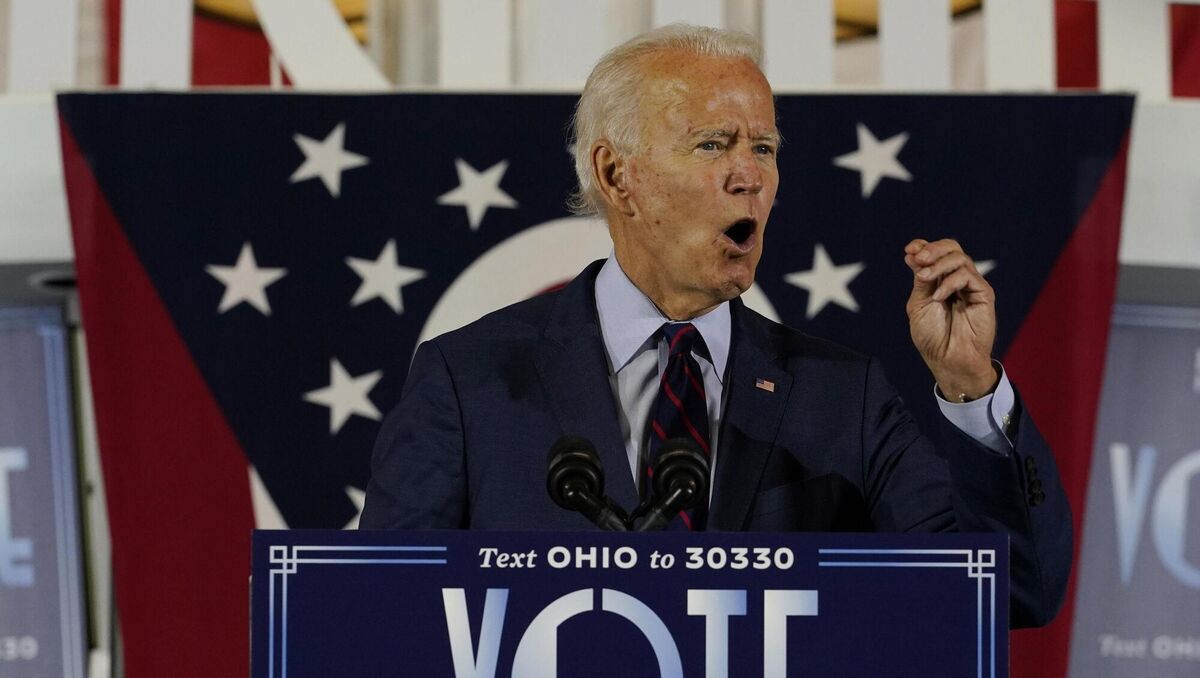Joyce Fegan: Why so many Americans voted for a sociopath like Donald Trump

A customer watches President Donald Trump on televisions in a shop in downtown Nairobi, Kenya. Picture: AP Photo/Brian Inganga
Almost 70m human beings placed a tick beside the name of a man who stood over the separation of traumatised babies from their refugee parents.
Almost 70m human beings placed a tick beside the name of a man who boasted about sexually assaulting women.
And almost 70m human beings placed a tick beside the name of a man who ridiculed science in a global pandemic, endangering millions of lives in the process.
How? How could so many millions of people vote for Donald Trump?
This is the question so many of us are left grappling with after election day. There was no landslide victory for Joe Biden. There was no punishment for Trump. Instead, America split firmly in two, with one side embracing a racist, misogynistic, autocratic, homophobic sociopath, and the other side voting “for decency”.
Why did so many millions of Americans for a sociopath?
Donald Trump is a master manipulator, always has been, always will be. He doesn’t come from academia. He doesn’t come from medicine. He doesn’t come from politics. His background is in sales and advertising. Manipulating people was Donald Trump’s bread and butter. He knows how to manifest his will, at any cost. He has a playbook.
Here is his playbook: he engages your core values and talks to them, not your brain. This is what the most effective sales and advertising people do all over the world. Just think about it, cigarettes smell absolutely foul, smoking them tastes absolutely disgusting, and cancer is the end point. Yet, Big Tobacco managed to sell us smoking all the same.
This is Donald Trump’s playbook:
“He describes the cupcake, and the Democrats describe the recipe,” is how messaging specialist Emily Duffy explains the allure of Donald Trump.

Ms Duffy is a fellow of Anat Shenker-Osorio, a world leader in messaging. She is also deputy director of Uplift, the independent campaigning organisation you’ve probably used to sign an online petition with.
Donald Trump is manipulator-in-chief. He is messenger-in-chief. Manipulative messaging is Donald Trump’s superpower. He gets it. And he uses it. He is also without morals so he really, really leverages it. He offends and insults and makes promises he has no intention of keeping, so long as it all plays to your core values, talks to your gut and gets you to vote for him.
Messaging is what political anoraks call it. Short slogans like “a lot done more to do”. Repeatable, easy-to-recall, nutritionally-dense sound bites. The more controversial, the more media time, Twitter time and water-cooler time they get. But messaging is just storytelling.
“We separate people into left and right, but people aren’t separated like that, in that binary way,” says Ms Duffy.
Instead, people are led by core values such as security, tradition, power, achievement and self-direction.
“What Donald Trump does is he pulls people towards the values of security, and he does this by priming them with fear first, and then offers security.
“When Democrats talk about jobs, they talk about the recipe. ‘We're going to invest $40bn here or increase tax there’. And what they invoke when they use that language is a money frame. People switch off. They’re actively asking people to use their slow brain.
“But what Trump does is he talks to the fast brain, the older part near the spinal cord, the amygdala. He describes the cup cake, what he will deliver, not the recipe. And that's all people need to hear — reassurance from a strong man,” explains Ms Duffy.
And isn’t reassurance, to feel good as quickly as possible when you feel afraid, all anyone wants? Even when that reassurance is totally and utterly false.
Democrats, on the other hand, made the mistake of talking to the critical part of people’s brains, the slow part, and “most people don’t have the time to engage like that, they just want to feel good,” says Ms Duffy.
And Donald Trump was reared in a culture of “toxic positivity” as his niece Mary Trump wrote. The house isn’t burning down, it’s lovely and toasty — get toasting those marshmallows kids.
Another ploy from Donald Trump’s “messaging” or storytelling playbook is “negation”.
“If someone says: ‘I think you're a criminal’, your instinct is to react and say: ‘I'm not a criminal.’ But by doing so, you're invoking the frame of criminal. The political right set the terms of the fight, they say bananas things, and we inadvertently repeat them by denying them.
“But what we need to do is centre ourselves in what we are for. Donald Trump will accuse people of being a “socialist” but instead of using his language you can say: “We believe that no matter who you are, you deserve a safe and affordable roof over your head,” says Ms Duffy.

To beat Donald Trump with his own playbook? Stop showing up to play his game on his pitch.
But messaging aside, there is no doubting that the inherent racism and white supremacy that is baked into the fabric of American society played a role in Trump’s vote too.
We need not look to Europe or Russia for dictators to compare him to. America was built on the genocide of native Americans and the enslavement of black people. This is as totalitarian as you can get and segregation only ended, in name, less than 60 years ago. This is a past America has yet to make peace with or reparations for.
And yet, the result on election day wasn’t all negative.
Joe Biden won more popular votes than any other presidential candidate of all time, including his former colleague Barack Obama. So while Trump’s playbook is effective, it is not that effective.
Progressive politicians like Alexandria Ocasio-Cortez and Ilhan Omar were re-elected. And more progressive politicians were elected for the first time. Mauree Turner, a 27-year-old black and queer woman, became Oklahoma’s first Muslim elected to state legislature. Sarah McBride became the first trans state senator in US history.
The world has never needed progressive politicians more than it does now. But in order to get elected, they need to invoke Donald Trump’s playbook of effective messaging.
An example — talking to your dad about climate change and the importance of recycling and eating less meat? Don’t talk about CO2 emissions and 1.5 degree temperature changes. Instead, talk to him about building a safe and secure world for his grandchildren to grow old in.
Tell a clear story. And talk to people’s core values.
Now imagine the kind of world we could have if progressive people employed the powerful force of effective messaging.






